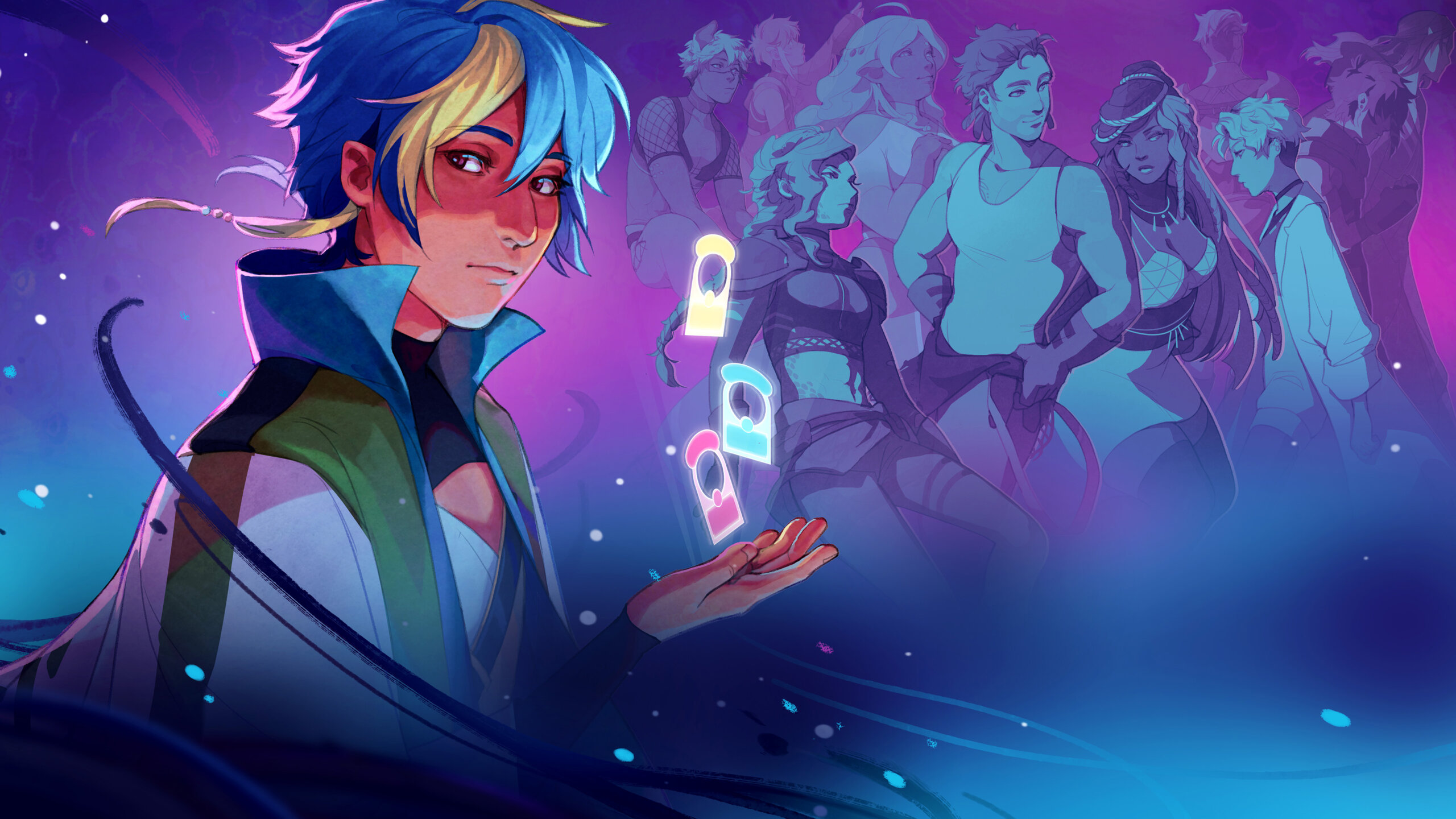Acidic blue snow sparkles on towering fungus trees. Earth plants grow in carefully constructed biodomes. A sentient AI teaches humanities, while willing volunteers help raise kids in a communal crèche. Welcome to the colony of Vertumna IV, the setting of Northway Games’ I Was a Teenage Exocolonist, which released August 25 for Nintendo Switch, PlayStation 4, PlayStation 5 and on Steam.
You play as Sol, a child conceived during a 20-year voyage to establish humanity’s first space outpost—so you’re stuck here, whether you like it or not. Every month, you pick an activity, be it going to class, playing sportsball, hanging out with friends … or exploring the planet you now call home. The game takes place over 10 years of Sol’s life, charting their journey from preteen to young adult.
Exocolonist shares some of its DNA with dating sims like Monster Prom, but it’s also an expansive narrative RPG with hundreds of events. And it’s a deckbuilder: Sol uses a deck of memory cards to play a poker-esque card game each month, with certain events granting new memories to improve their deck. Players can tailor the game to whatever they’re most interested in, whether that’s making the card game harder, getting rid of it altogether or skipping over dialogue they’ve already seen.
“Like the life that we represent in Exocolonist, the game is intended to be many things,” Lindsay Ishihiro, writer and narrative designer for I Was a Teenage Exocolonist, tells Xtra over a video call.
Ishihiro, who has a background in comics and fanfiction, was originally hired to design character art for the game. But they ended up helping lead developer Sarah Northway flesh out the hundreds of events that make up the story. The game’s script clocks in at over 600,000 words, with more events than you can see in one playthrough—and some storylines that can take numerous attempts to fully unravel.
The game is gorgeous and evocative, but deals with plenty of heavy subject matter. There’s a content warning that’s easily accessible listing out all the possible triggers, and different levels of detail depending on how many spoilers you want to see. That sets the tone for the game as a whole: bad things can happen, but it never feels hopeless.
A big part of Exocolonist’s charm lies in its characters. While there are adults who make up the bulk of the implied colony, Sol spends most of their time with their peers—the other kids figuring out growing up on Vertumna. All of them are dateable, no matter Sol’s gender or presentation, though Ishihiro notes that choice was carefully weighed to avoid “playersexuality,” where characters are interested in dating only the player character.
“We wanted to make sure all the characters felt like real people who had sexual desires of their own, had orientations of their own, and even if they would be in a relationship with your Sol, they still had their preferences,” Ishihiro says. “So, trying to do that without flattening everyone into ‘In the future, everyone’s bisexual’ … we just tried to do it right.”
Your friends flirt with and date one another. Without intentional interference, there are two couples who always begin dating. And there are ways to be consensually polyamorous in different configurations. Happy-go-lucky Nomi-Nomi is demisexual, while serious scientist Tangent is aromantic but interested in popular girl Marz.
And romance itself is entirely optional: friendships are important and meaningful in their own right, without certain events being locked behind arbitrary romance gates. Sure, you can be as straight and monogamous as you want—or a non-binary cutie with a boyfriend, girlfriend and a platonic roommate—or completely uninterested in dating.

Credit: Courtesy Northway Games
Then we have gender. As Ishihiro explains it, Sol has three axes: their pronouns, their physical appearance and their reproductive anatomy. The latter is tied into a puberty event at age 13. (There are three choices, with one letting Sol opt out of gendered puberty entirely.) But even picking a specific set of physical changes doesn’t assume a specific gender.
Sols who choose puberty have a parent give them a talk, to “honour this capability [they] now have in a way that does not gender [them] at all.” It’s rare to see wet dreams or menstruation discussed in video games, let alone in gender-neutral, non-judgmental ways.
And how the future technology handles transness is explicitly mentioned: Tangent is a trans woman who knew her gender from a young age. “Genetech” lets her experience her body in a way that matches her experience. “Her transition is complete before she’s even hit puberty, so I was able to look at what happens when a trans character is fully actualized as the person they want to be, then what happens to them after that,” Ishihiro says.
Being trans is a core part of Tangent’s character, but her storyline isn’t about transitioning. Rather, being able to change her body with comparative ease has led her to wonder what else she can change, sparking an interest in transhumanism and biohacking. (Ishihiro says Tang is “a little love letter” to their trans women friends who are “hard nerds.”)

Credit: Courtesy Northway Games
Exocolonist has also picked up buzz for how it handles pronouns, so much so that it’s sometimes referred to as the “blue hair and pronouns” game. Sol can change their name, pronouns and physical appearance anytime, without comment, or impact on their existing relationships. He/him, she/her and they/them exist alongside custom pronouns that seamlessly integrate into the game’s dialogue. As Ishihiro wrote on the game’s release, “In space, anyone can be fae/faeself.”
Indie games have limits on character customization and Sol is no exception. Their late-teen default appearance ties long hair and a slight bust to feminine appearance, making gender expression locked to hair length in a way that seems out of sync with the rest of the game’s expansive view of identity. But overall, Ishihiro says the choices “represent not just cis bodies and binary trans bodies, but a whole spectrum of gender nonconforming bodies and spectrum-defying trans bodies.”
The game’s diversity came in part from the team who were making it. Ishihiro notes that the game had queer, trans and agender members. Representation was “baked in, because we’re making those characters that are from ourselves … it was in the game, sort of like DNA from the ground up.”
For me, one of my main takeaways from the game was how good it felt to be in a world where queerness was normal and celebrated, and how much more room that made for everything else.
Exocolonist, in the way a lot of speculative sci-fi does, holds a mirror to our own world, grappling with questions of capitalism, colonialism and resource extraction. Sol’s idealized version of the colony changes as they grow up, and the choices they pursue can result in a huge range of political, environmental or philosophical changes. There’s no one golden ending, where everything is perfect—just endings that the player can feel more or less satisfied with.
It’s your life on Vertumna. What will you make of it? Obviously … I made mine gay.


 Why you can trust Xtra
Why you can trust Xtra


